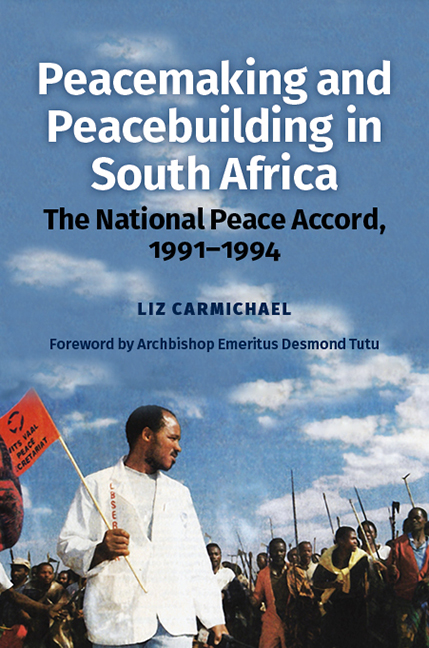Book contents
- Frontmatter
- Dedication
- Contents
- List of Illustrations
- List of Abbreviations
- Glossary
- Acknowledgements
- Note on Nomenclature
- Transition Timeline
- Foreword
- Introduction
- Part One Peacemaking, Peacebuilding, and the South African Conflict
- Part Two Peacemaking
- Part Three Peacebuilding
- Conclusion: Impact and Unfinished Business
- Bibliography
- Index
6 - Deadlock and the President’s Summit
Published online by Cambridge University Press: 08 October 2022
- Frontmatter
- Dedication
- Contents
- List of Illustrations
- List of Abbreviations
- Glossary
- Acknowledgements
- Note on Nomenclature
- Transition Timeline
- Foreword
- Introduction
- Part One Peacemaking, Peacebuilding, and the South African Conflict
- Part Two Peacemaking
- Part Three Peacebuilding
- Conclusion: Impact and Unfinished Business
- Bibliography
- Index
Summary
Introduction
In May 1991 de Klerk attempted to call all parties to a Summit on violence. The liberation movements boycotted the event, demanding an impartial convener. Church and business leaders separately made efforts to overcome the impasse, then by joining forces they were able to insert themselves into the process as facilitators. The President's Summit went ahead, as did the boycott, on the understanding that church and business would then convene a more inclusive peace meeting.
Deadlock
The ANC was now setting deadlines. Its National Consultative Conference on 16 December 1990 charged the regime with failure to release all political prisoners, allow all exiles to return, and repeal the Internal Security Act: it had therefore failed to create a ‘climate conducive to peaceful negotiation for a new constitution’. Further, the current violence was – and was intended to be – an obstacle to negotiation. The Conference still mandated the NEC to proceed with ‘talks about talks’, but all obstacles must be removed by 30 April 1991 or the ANC would consider suspending the whole negotiation process.
In early April at an emergency NEC meeting Mandela discussed, as he puts it, his ‘doubts about Mr de Klerk’ (Mandela, 1994 p.708). As de Klerk puts it, Mandela ‘expounded his views about the government's complicity in violence’ (De Klerk, 1999 p.206). The ANC believed the government could stop the violence if it wished, but was rather fomenting it, to prevent free political activity and the start of negotiations.
On 5 April the NEC sent an Open Letter to Cabinet, an ultimatum expressing the ANC's perceptions and demands (text in Mandela, 1993 pp.85–91). It blamed the IFP for attacks, turning hostels into strongholds and bringing in supporters to stage ‘provocative armed’ demonstrations, ‘escorted by the police’. The government, it charged, was complicit. The IFP was recruiting township councillors, offering protection by force against ANC demands that they resign. The letter accused the police of ‘partiality, connivance, and complicity’, of attacking ANC supporters and failing to investigate massacres, train violence and the supply of firearms.
- Type
- Chapter
- Information
- Peacemaking and Peacebuilding in South AfricaThe National Peace Accord, 1991-1994, pp. 94 - 110Publisher: Boydell & BrewerPrint publication year: 2022

